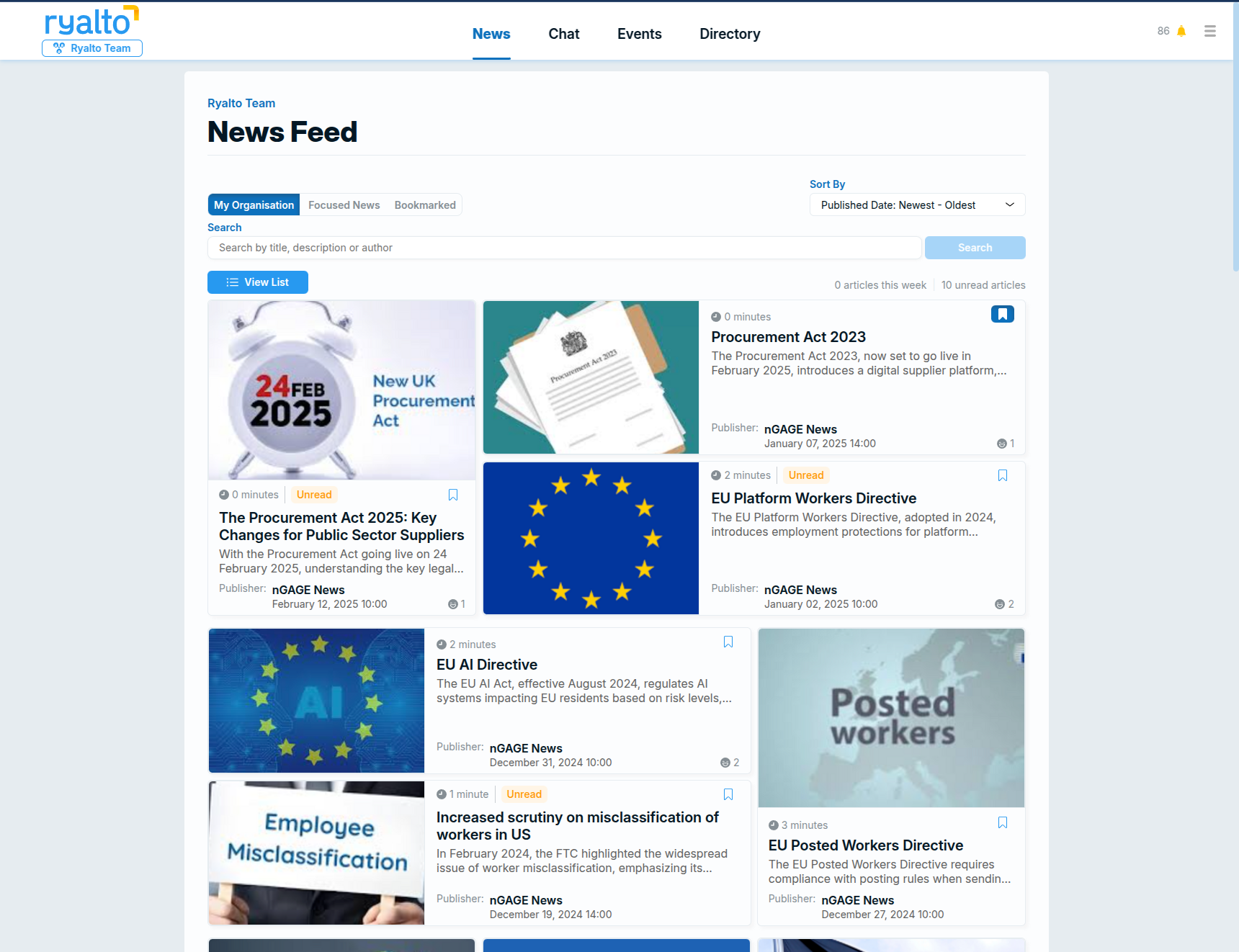The Ryalto News Feed allows users to stay up to date with what is happening in their organisation. The articles a user sees on their news feed are tailored based on their Audience.
Ryalto’s news feed is designed to look and feel familiar to users, but instead of being driven by a black-box algorithm, the content that users see is controlled by news feed admins.
Users can read, react to and comment on articles. They can also bookmark articles if they want to come back to them later. Admins can view this engagement in real time.
There multiple levels of news-feed admin permissions. Ryalto has sophisticated article creation functionality. Article creators, publishers and admins can write news feed articles with block-based rich text tools, add header images and attach documents.
The article publishing functionality is separated from the article creation to allow different levels of permissions. Article Publishers and Admins have a range of functionality to allow them to publish articles to their organisation in the way they want to. They can control when and if the notification will appear on a user’s device, and how it will look when it does.
By default, articles are only viewable by the audience which they were shared to, however an admin can choose to make an article public to allow it to be shared outside its specific audience.
An article can be scheduled for a future date, featured to give it more prominence, and pinned to ensure it stays at the top of the user’s news feed. Ryalto also allows different categories of articles, which are displayed in separate tabs. Articles can also be set to expire after a certain period of time and published under pseudonyms instead of the user’s name.
Articles can also allow readers to express interest in an article. When a user clicks the “express interest” button an email is sent the address set when creating the article. This can be used to gather interest about job alerts or events such as a festive party.
View News Feed
The News Feed is sorted into categories and can be searched. From here, a User can see:
- The number of new and unread articles.
- The number of articles posted recently.
- A separate tab for their bookmarked articles.
- Which articles are new and unread.
- Which articles are featured.
The following is visible to the User for each Article:
- The article image, title, and description.
- A time estimate for how long it should take them to read.
- The number of reactions and comments.
- The article’s author.
- The date when the article was posted.

View Article
Allows the User to read an article.
Within the article, the User can perform the following actions:
Reacting to Article
The User can react to an article and see a list of other reactions and who made them. There are 4 available reactions for articles and article comments.
Commenting on Article
Users can comment on an article. Comments can be left in reply to another comment. Users can edit and delete their own comments. News Feed Admins can delete comments (for moderation purposes).
Reacting to a Comment
A User can react to any comment and see a list of other reactions.
Bookmarking an Article
The User can bookmark an article. Bookmarked articles appear in a separate tab.
Expressing Interest on an Article
If an admin has marked an article as open to expressions of interest and provided a target email, users can click a button to express interest in an article, providing an email with the user’s name to the target inbox.
This simple feature caters to a variety of use-cases such as gathering applicants for a new job opening to seeing who would be interested in a work social event.
Sharing a public article
If an admin has allowed it, a User can get a public shareable link to an article. This allows the sharing of articles outside the initial audience and outside Ryalto
Admin Types
There are different levels of admins for articles:
- Creators can create articles but are unable to publish them,
- Publishers can create and publish articles which they created or are associated to sites and departments they are part of, and
- Admins can create and publish articles to all audiences within the organisation.
Creating an Article
More Details Coming Soon
Publishing an Article
More Details Coming Soon
Article Analytics
More Details Coming Soon